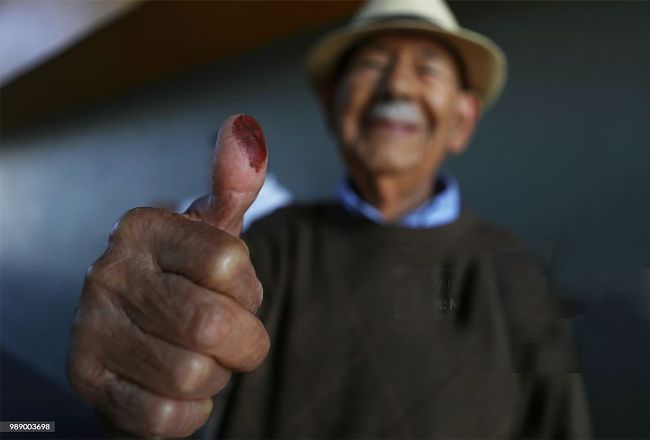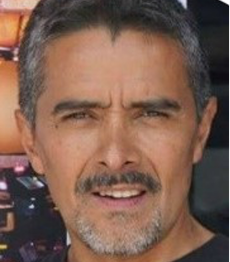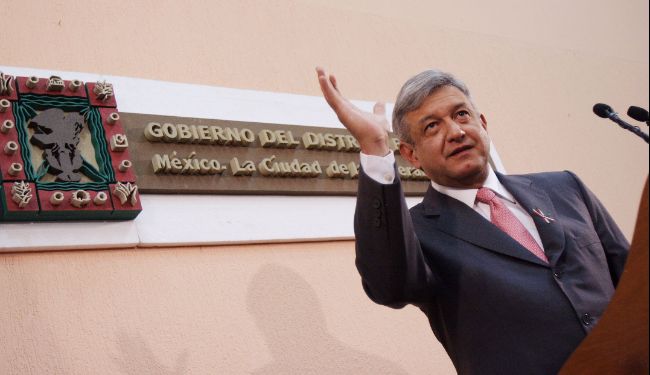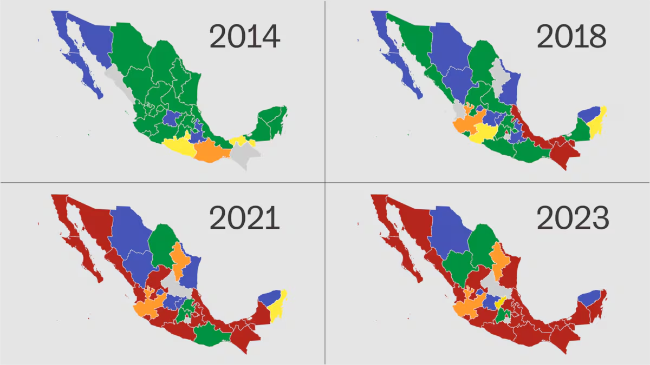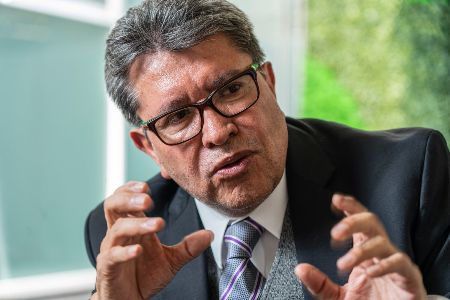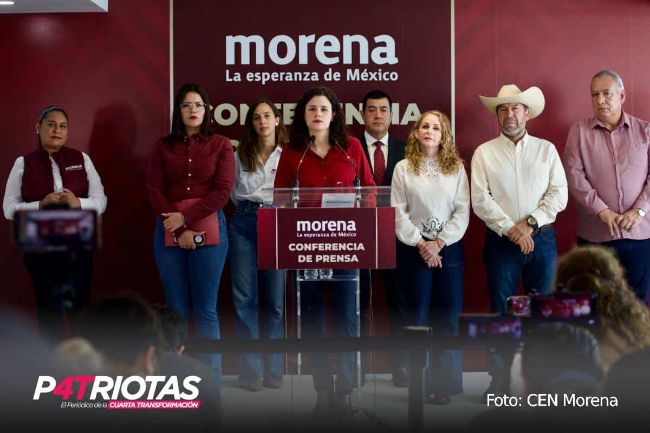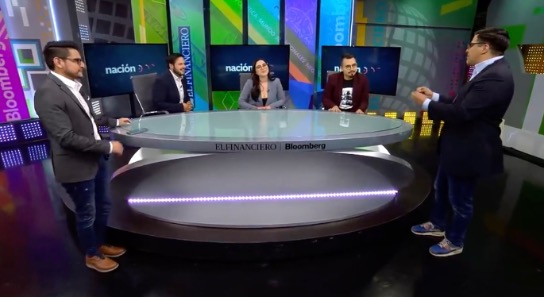|
|
The weekly newsletter of the Mexico Solidarity Project |
|
Every issue archived online at mexicosolidarityproject.org/archives/ |
|
October 29, 2025 |
|
|
|
Fingers: Political Parties and the People |
|
Meizhu Lui, for the editorial team |
|
|
Getty Images: Credit: Mario Tama |
|
How does a political party stay in power for 70 years, as the PRI did in Mexico? The 1917 constitution limited presidents to only one six-year term, preventing one-man dictatorships. But it didn’t prevent one-party dictatorships.
The PRI took control of all Mexico’s organizations, governmental and non-governmental. It appointed judges who did its bidding, such as allowing wealthy leaders to avoid paying taxes. It even appointed union presidents, whose job was to “protect” the companies allied with the PRI from workers’ anger. Presidential continuity? Called the dedazo, from dedo or “finger,” each president pointed his finger at the man he chose to succeed him, and that man was duly elected.
The president and the PRI pointed a different finger — the middle one — at the people! F… you! Your votes, your lives, your hopes don’t count!
In 2000, for the first time, the people elected a president from a different party — the PAN. But was that a real choice? The neoliberal PAN was a “mini-me” of the PRI, which was obvious when they later joined forces in the “PRIAN,” as the people snarkily called it. Under these conditions, in 2014, the anti-neoliberal Morena party was formed.
In 2018, a groundswell of popular support for the Morena candidate, Andrés Manuel López Obrador, swept him into office. The vote was so overwhelming that even the usual machinations of electoral fraud on the PRIAN’s part couldn’t invalidate the results.
Mainstream pundits claimed that AMLO used the dedazo to ordain his successor, Claudia Sheinbaum. But in fact a popular poll chose her, and she’s an even more popular president than AMLO! As Javier Bravo recounts, Morena is the party not of the oligarchy but, for the first time ever, of Mexico’s working people.
At polling stations, voters’ fingers are imprinted with an ink stain to show they voted. That ink stain has become a point of pride: now the people’s fingers point to the nation’s next leaders. |
|
|
Morena: From a Movement to Leading a Nation |
|
Javier Bravo is a left-wing Mexican activist who calls himself a Morena dissident; he is pushing from within to improve its members’ ethical and political education and bring Morena closer to the Mexican people. An archaeologist, teacher, and union activist at the University of Guanajuato, he believes political education is the main activity that will enable Morena to stay on the path to transformation. To that end, he coordinates the local education program for rank-and-file Morena members |
|
|
Were you involved with Morena before it became a political party? How did it become a party?
In 2005, the right wing attempted a coup against AMLO when he was mayor of Mexico City. It backfired. The social left was outraged — including me! That’s when I got involved. AMLO emerged stronger than ever.
AMLO was in the Party of the Democratic Revolution, or PRD, supposedly to the left of the ruling party, the Institutional Revolutionary Party, or PRI. But he saw that the PRD was becoming garbage — its leaders just looking for personal benefits. Mexico needed a new structure based on people from the social movements in order to challenge the existing system.
In 2010, AMLO came to Guanajuato and spoke to us about forming a new organization. Two points stuck with me. First, he talked about ending corruption, which wasn’t only about politicians getting rich from their positions. Everything that fails to help the common people IS corruption! It’s violence! It destroys people’s aspirations for a life of well-being. |
|
|
AMLO, then mayor of Mexico City, speaks at his daily news conference on Friday, April 1, 2005. (Susana Gonzalez / MCT / Tribune News Service via Getty Images |
|
Second, while the leftist tradition often paints electoral politics as a nasty business to avoid, AMLO rebutted that view. He asserted that we are all politicians, political actors. That is, we can enable others to live poorly or to live well. We can liberate ourselves.
At this stage, we were following AMLO as a person. Then, as he requested, we coalesced around the principles he stood for to become a social movement. Morena, the “Regeneration Movement,” became an official NGO.
Next, we organized thousands of assemblies to decide whether to become a political party. I was pro-party myself — we had to be more than an opposition group. Only as a political party could we change the laws and even the Constitution. We had to stop depending on existing political parties to pass our agenda — making us no more than “left parasites”! The YES vote won.
To qualify as an official national party, we needed 3% of the electorate, and, in 2014, we reached that milestone. In 2015, we won 8% of the vote in the midterm elections. Then in 2018, AMLO won the presidency with 55% of the vote, an amazing leap of popularity in a few short years.
Is Morena still rooted in the social movements, or has it become an electoral machine? President Sheinbaum has a nearly 80% approval rating — but approval of the Morena party is only around 50%. |
|
|
The rise of Morena: In one decade, the political party has wiped the PRI from Mexico’s electoral map. Pablo Ferri, June 0, 2023 El Pais. Red represents Morena majority. |
|
Morena IS a movement! It has two million party members, but 36 million voters support it, and that number keeps growing.
At the municipal level, some corrupt mayors ran on the Morena ticket, but they weren’t leftists. Also, nepotism has been a long-time feature of our government, and it continues today. These unethical Morena politicians might be undermining party support.
But nothing is perfect because of the finite human condition. Shit happens!
What’s different is that we talk openly about the corruption within our own ranks. We don’t protect corrupt politicians; we name names of those who ignore AMLO’s three principles: “Don’t lie, don’t steal, don’t betray the people.” We prosecute where necessary.
Ricardo Monreal, a former PRI official known to be corrupt, now coordinates the Morena delegation in the Chamber of Deputies. Is that just “shit happens”? |
|
|
|
Ricardo Monreal: Carmen Morán Breña: El Pais / Lilly Téllez: Crédito: Archivo: Mayolo López: Reforma |
|
Monreal is an opportunist. But people know him. In 2023, out of eight Morena candidates putting their hats in the ring to run for president, Monreal came in last. Don’t worry, he’ll never be president!
However, he played a necessary and good role when he negotiated with the PRI and PAN parties to promote a dialogue with them in order to get the votes required for Morena reforms. He’s not the devil.
But there are devils — like Lilly Téllez! In 2018, AMLO knew quickly he’d made a mistake in inviting her to run for senator on the Morena ticket. She emerged as a hard rightist, who quit Morena in 2020 to become a PAN party leader. She called the AMLO and Sheinbaum governments a military dictatorship, even allying with the US against Mexico’s sovereignty.
Many opportunists have joined Morena for their own gain. Should Morena have stricter rules for joining?
No. We’re doing the opposite. Morena has started a membership campaign, and anyone can join, because it’s a constitutional right to join any party you choose. However, at the party congress in June 2025, our party leader, Luisa Maria Alcalde, proposed that grassroots experience be a qualification for political office. We’ll see if this works. |
|
|
Luisa Alcalde begins national tour for the creation of MORENA branch committees. Courtesy of P4TRIOTAS. |
|
In August, Morena began organizing sectional committees in every electoral district in the country. I like this idea because the committees’ objective is to bring Morena closer to the people. Morena will conduct political education, train new leaders and find new candidates.
In the past, we’ve tried other methods such as committees based on either a geographical or a constituency basis. For instance, I was asked to organize the professors from Guanajuato universities. The idea of sectional committees grew out of lessons learned in previous efforts.
What do you think a US progressive stance toward Mexico should be? |
|
The Morena government hasn’t just made a few legal reforms and some new social welfare programs. We’re achieving a total transformation of our political regime — a new revolutionary project. When we talk about the “people,” we mean the excluded, the exploited, the poor — not Carlos Slim, not Peña Nieto. When we talk about “corruption,” we don’t only mean not taking bribes, but having ethics in our political and personal lives, dedicated to serving the people. When we talk about support from the people, we don’t only mean their ballot. We mean their understanding that all Mexicans must work for the collective good, not for individual gain. |
|
|
What is its role in the Fourth Transformation? MORENA, the phenomenon party of Mexican politics. Sebastián Ramírez, Estefanía Veloz, and Marco Romero analyze the topic. Nación 321, You Tube |
|
Today, the US is the main threat to the world’s people. Its leadership is corrupt, violent and materialistic, and they demonstrate clearly how those practices impoverish and repress even their own people. Therefore, US leftists should concentrate on fighting their own government’s fascist, imperialist agenda. A focus on criticizing Mexico’s imperfections strengthens the hand of the US.
In the minds and eyes of the world, Mexico is inspiring. It is moving toward real democracy and defends its own sovereignty and the sovereignty of all countries against Western domination. Of course, it’s not perfect. We welcome helpful criticism from US leftists — but given how the US threatens us, we need you to support Mexico’s sovereignty and its radical path of transformation.
I’m not naive, but I have hope. I’m committed to making our country and our world free from corruption in the broadest sense. |
|
|
|
|
México Canta Takes on the Narco-corridos |
|
|
Sergio Maya, 21, from Tula del Allende, winner of “Mexico Canta” contest Courtesy of Mexico’s Secretary of Culture |
|
The original of this article by Tibisay Zea is available in the September 26, 2025 issue of The World. It has been edited here for length and clarity.
Narco-corridos — ballads glorifying the lives of drug traffickers and cartels — are hugely popular in Mexico, racking up billions of streams online, propelling artists like Peso Pluma to the top of the charts. But the Mexican government is hoping to counter their influence; it’s sponsoring a televised music contest called “México Canta por la paz y contra las adicciones” (“Mexico Sings for Peace and Against Addiction”) with one big rule — no lyrics that glorify violence or drug trafficking.
The contest resembles the US show “American Idol.” Young Mexican singers from the US and Mexico step onto a brightly lit stage, perform before a panel of judges, and wait nervously for feedback. An amazing 365 performers joined the competition. One judge is singer and actor Regina Orozco. She says the aim is to show young people “another perspective, another way to make a living — not by picking up a gun, but by choosing a much more powerful weapon: music.”
The contestant, Alex Moreno, performed his song “Anti-corrido,” and the lyrics go: “We don’t want to sing anymore about your poisoned war.” In a video, he said he’s deeply concerned that narco-corridos are so widespread that even children listen to them.
Several Mexican states have banned narco-corridos’ performances on stage or radio.
But censorship often backfires, says Juan Carlos Ramírez-Pimienta, a San Diego State University professor who studies narco-corridos. “The government has censored narco-corridos since the 1990s, and all they have done is make them more popular.”
Mexico’s President Claudia Sheinbaum prefers to promote a “culture of peace” rather than bans.
Some skeptics warn that contests like “México Canta” can only go so far. Ramírez-Pimienta argues, “In order to make narco-corridos less prevalent, you have to make the source of narco-corridos less prevalent.” If the government is serious about countering the influence of narco-corridos, it must focus on cracking down on organized crime.
But for cultural promoter Isael Gutierrez, president of Music VIP Entertainment, the contest is an important start. “This is just the beginning; it’s about discovering and supporting new talents that can carry a new narrative.”
Sergio Maya, from central Mexico, was crowned the winner on October 5 with his patriotic mariachi performance. He and two other winners will receive a contract with transnational or independent record labels, announced Federal Secretary of Culture Claudia Curiel de Icaza. (Ed).
With millions tuning in on public TV and radio, organizers hope the contest will help a new generation of performers share songs that reflect pride, identity and peace — an alternative soundtrack to the violence shaping Mexico’s most controversial musical tradition. |
|
|
|
Recent news reports and commentaries, from progressive and mainstream media, |
|
Stephen Eisenhammer and Shariq Khan, Mexican president says US players involved in fuel smuggling Reuters. "Yes, there are U.S. business people in the cases under investigation," Sheinbaum said. "One cannot explain otherwise how fuel comes from the U.S. to Mexico and enters illegally."
Alma E. Muñoz y Alonso Urrutia, Washington y México investigan a empresarios 'huachicoleros' de EU La Jornada. Empresarios estadunidenses son investigados por la Fiscalía General de la República (FGR) por su participación en el contrabando de combustible y también se indaga en el Departamento de Justicia del país vecino, reveló la presidenta Sheinbaum.
Mexican President Sheinbaum Pledges Justice in Killing of Lemon Growers’ Leader Telesur. At the end of September, Bravo said that lemon producers were “permanently held hostage” by the fees imposed by organized crime for their harvests.
México mira al cielo: nace el Centro Nacional de Imágenes Satelitales para la soberanía tecnológica HansDigital. Con esta nueva infraestructura, el país dejará de depender de empresas extranjeras para observar su propio territorio, ahorrará millones de pesos al año y abrirá nuevas rutas para la ciencia, la agricultura y la seguridad nacional.
Karina Suárez, Slowdown in industrial activity and investment casts doubt on Plan Mexico’s ability to shore up the economy El País. Domestically, Martínez identifies a weak microeconomic outlook, with gross fixed investment failing to rebound, meager public spending, weak private consumption and finally, a decline in formal job creation.
Lilia Aguilar Gil, Amparo, sí El Universal. Quizás uno de los casos más injustos y deleznables que empresarios “poderosos” y “privilegiados” pueden hacer es negarse a pagar impuestos, con deudas de hasta 74 mil millones de pesos y más.
Mexico Begins Consultations With Producers to Redefine the USMCA Deal, Telesur. The goal is to reach January 2026 with a broad national position based on agreements among the different sectors.
Luis Hernández Navarro, El camarada Alejandro Villanueva La Jornada. Por años, el nombre de batalla de Enrique Semo en las filas del PCM fue Alejandro Villanueva. La publicación de su libro sobre el laberinto de la izquierda mexicana lo recuerda. La obra muestra que las luchas emancipadoras comenzaron hace muchos años.
Mexico Blocks Tulum Hotel in Protected Park, Riviera Maya News. The denial was due to the development already being built within a protected natural area without having obtained the required authorizations beforehand.
Juan R Hernández, Alito Moreno, el político más odiado de México Diario Basta! Rechazo ciudadano alcanza a opositores y empresarios, Alejandro Moreno, Lilly Téllez y Ricardo Salinas Pliego figuran entre las figuras peor evaluadas del país. |
|
|
|
|
The Mexico Solidarity Project brings together activists from various socialist and left organizations and individuals committed to worker and global justice. We see the 2018 election of Andrés Manuel López Obrador as president of Mexico as a watershed moment. AMLO and his progressive Morena party aim to end generations of corruption, impoverishment, and subservience to US interests. Our Project supports not just Morena, but all Mexicans struggling for basic rights, and opposes US efforts to undermine organizing and Mexico’s national sovereignty.
Editorial committee: Meizhu Lui, Bruce Hobson, Agatha Hinman, Victoria Hamlin, Courtney Childs, Pedro Gellert. To give feedback or get involved yourself, please email us! |
|
Subscribe! Get the Mexico Solidarity Bulletin in your email box every week. |
|
Web page and application support for the Mexico Solidarity Project from NOVA Web Development, a democratically run, worker-owned and operated cooperative focused on developing free software tools for progressive organizations. |

